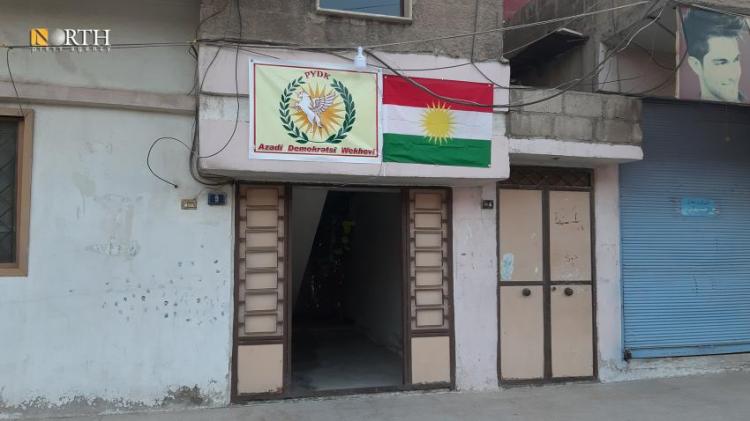QAMISHLI, Syria (North Press) – In a room decorated with the portrait of Kurdish leader Mala Mustafa Barzani (an Iraqi Kurdish leader who rebelled against the Iraqi regime), Fassla Youssef, the secretary of the Kurdistan Unity Party and a member of the Presidency in the Kurdish National Council (ENKS) received well-wishing delegations for the opening of her party's headquarters in the city of Qamishli, after the council reached an initial understanding to seek a political agreement with the Kurdish National Unity Parties (25 parties, formed on May 20, 2020, to support the Kurdish unity talks).
ENKS, a coalition of Syrian Kurdish political parties allied with the opposition Syrian National Coalition, returned to its political activities and reopened its parties’ headquarters and local councils in northeast Syria after nearly three years of their closure due to political and administrative disputes with the Democratic Union Party (PYD) and the Autonomous Administration in North and East Syria, in conjunction with steps for dialogue with National Unity Parties to agree on political and administrative partnership .
Partnership, not sharing positions
Fassla Youssef told North Press that “the stage level of the initial intra-Kurdish talk wasn’t complicated and difficult, despite the intellectual and political differences between the two parties, the emergence of some obstacles, and outstanding disputes between the two parties, such as the detainees.”
"The aim of the intra-Kurdish dialogue is to reach a real partnership at the political, administrative, and military levels – it isn’t sharing positions and ministries,” Youssef added.
Intensification of activity
Mohsen Tahir, official of the Kurdistan Democratic Party – Syria and head of the local councils in ENKS, said that, “the council will intensify its political, diplomatic, and public activities to prepare for the intra-Kurdish understanding.”
"We as ENKS will spare no effort during the next stages to provide the necessary facilities to reach the comprehensive agreement, politically, administratively, and militarily, and to implement it practically on the ground," Tahir added.
Optimism and Relief
In the city of Derbasiya, members of the local council of ENKS met on Friday to reach a political agreement that brings the Kurdish parties together in the face of the new political phase in Syria.
Tahir added that “the intra-Kurdish dialogue created a comfortable atmosphere among the people in the Kurdish community; also all communities gained more reassurance and comfort, and [they] created an atmosphere of optimism and stability.”
Led by all communities
Youssef reassured the Kurdish parties and other political communities that ENKS isn’t against their participation in forming the future of the area.
“They are working on the participation of ENKS in the political decisions of the Autonomous Administration and reaching an integrated agreement at the political, administrative, and military levels,” she added
Mohesn Tahir added that “the intra-Kurdish talks will add a dimension to the peaceful solution of the Syrian crisis, in accordance with international legitimacy. It will seek to create delicate balances of regional and international interests and powers, respect the interests of all parties, adhere to the foundations of friendship in the region, and respect the rights of all Syrian communities."
ENKS and the PYNK announced that they reached an initial understanding on a political vision for Syria stemming from the 2014 Duhok agreement on the 17th of this month. This came after a long-term intensive dialogue on the initiative of Syrian Democratic Forces (SDF) commander-in-chief Mazloum Abdi, and with direct American support and sponsorship.
Challenges and Risks
Observers of the Kurdish Question believe that the initiative to unify the Kurdish parties in Syria would lead to solutions in the political, administrative, economic, and military issues stuck between the two Kurdish parties, in addition to unifying visions of the challenges and risks facing the region.
Youssef talked about the ENKS delegation’s visit to Turkey in February, and their meeting with the Turkish foreign minister Mevlut Cavusoglu. Youssef indicated that it is formulating its policies in accordance with the interests of the Kurdish people in Syria, and supported this visit, even though she did not participate in it for personal reasons.
She noted that Turkey plays an important role in the region, and is also a member of NATO and a neighboring country to Syria and the Kurdish regions.
Reported by Abdulhelim Suleiman, editing by Lucas Chapman)

